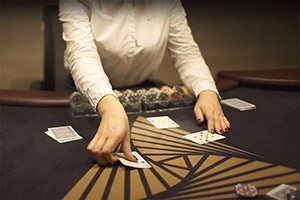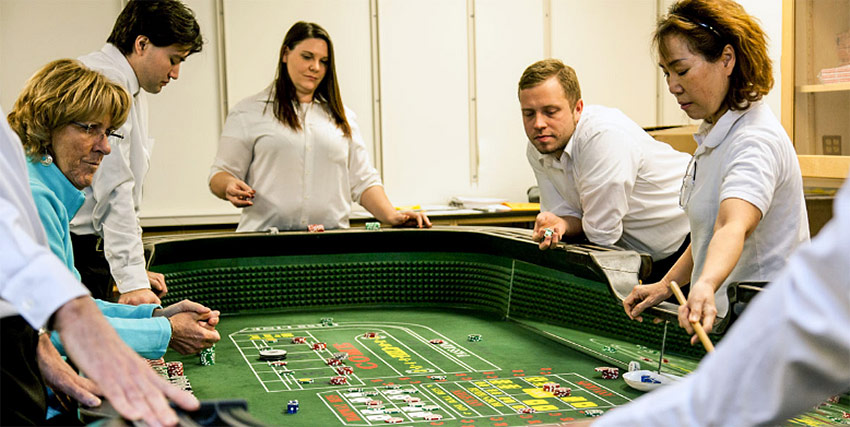How to Become a Casino Dealer in 2026

A dealer is a casino employee responsible for running the games. From the outside, their job may look quite simple and trivial. But in reality it is hard work that requires a lot of personal and professional skills. This article contains all the information about a becoming dealer at a casino. Do you think this could be a job for you? Let’s find out.
Responsibilities of a Dealer in a Casino
Every day dealers perform a variety of tasks:
- Laying out and issuing chips.
- Explaining the rules and terms to the players.
- Accepting bets.
- Shuffling and dealing cards, launching the ball and the roulette wheel.
- Maintaining control over the game and compliance with the rules.
- Dealing with conflict situations politely.
- Announcing winners.
- Calculating and issuing winnings with chips.
- Maintaining goodwill and comfort at the table.
In some casinos, dealers have assistants called chippers. Their tasks are simpler, for example, separating chips by value and color or parsing card decks by face value and suits. Usually, chippers are beginners learning to become croupiers (dealers).
Can the Dealer Affect the Game
There is an opinion among gamblers that the outcome of card distributions and the results of the spins of the roulette wheel largely depend on the dealers. However, they can’t affect the results of the games. Everything is decided by chance.
Every action performed by the person working as a dealer is strictly regulated and recorded on camera.
Dealers run games according to the general rules and instructions from casino management. Deviating from them even slightly is a strong reason for dismissal.
Basic Requirements and Skills
To become a dealer, a candidate has to have the following qualities:
- Politeness, friendliness, and communication skills.
- Correct, smooth speech.
- Ability to perform quick mathematical calculations in mind.
- Attention to detail.
- Good memory.
- Well-developed eye-hand coordination.
- Stress resistance and the ability to control emotions.
- Punctuality.
Generally, people from 21 to 30 years old are accepted for the job. There is no higher education required: it’s enough to have a high school diploma.

Appearance
When selecting candidates for the position of a dealer, there are also requirements for their appearance:
- Absence of visible tattoos, scars, and defects on open parts of the body.
- Physical stamina.
- Pleasant and well-groomed appearance.
Upon taking office, employees are given a uniform. Most often it is trousers, a white shirt, and a vest. At some casinos, female dealers wear formal dresses. In any case, clothes have to always be perfectly clean and ironed.
The uniform is sewn without pockets so that dealers cannot commit fraudulent actions — stealing chips or money from customers, replacing decks with labeled ones, etc.
How to Become a Professional Dealer
There are no specialized dealer training centers. Casinos organize and conduct training programs independently. This is an advantage for the candidates because they can get training for free and immediately get a job upon completing the course.
School Application
There’s a rigorous selection process In dealer schools. Applicants have to apply for training by providing the following information:
- Full name
- Date of birth
- Personal qualities
- Previous jobs
- Experience in the service industry
- Education
- Knowledge of foreign languages
Entrance Exams
After considering and reviewing applicants, suitable candidates are invited for testing. During the testing, they evaluate the following qualities of the candidates:
- Logical thinking
- Speed and accuracy of mathematical calculations
- Knowledge of the basic rules of casino games
- Visual memory
After successfully passing the entrance exams, candidates begin their training. It usually takes 2 to 6 weeks. Classes are held Monday through Saturday and last for 4-6 hours.
As the course progresses, students take intermediate exams. It allows casinos to track their progress and weed out those who can’t keep up.

End of Training
To complete the program, students have to pass their final test. If an applicant gets a passing number of points, they are interviewed. If the interview goes well, they sign a contract for 6 or 12 months with the option to extend it at the request of both parties.
Career
After training and enrolling in the staff, the employee begins work as an assistant to the dealer — a chipper. After successfully passing the trial period that lasts 2-4 weeks, the employee takes up the position of a dealer maintaining low-limit tables. As they gain experience, they move to other halls where customers play at higher stakes.
Further career advancement occurs as follows:
- Inspector. Supervises several tables at the same time, following the actions of the dealer.
- Pit boss. Responsible for the reception and seating of guests, order, and comfort in the halls.
- Manager. Supervis
Wage Level and Fines
Dealers don’t have a fixed monthly wage. Their average salary level depends on the number of shifts. Bonuses and tips may increase the dealer’s monthly income by $500-$1,200.
The dealer has to work at least 10 full shifts per month.
Attractive wages are accompanied by a system of fines. Dealers are fined for the following violations:
- Untidy appearance.
- Make-up and/or hairstyle that doesn’t meet the requirements established by the casino.
- Mistakes at the table: dealing the cards in the wrong order, incorrect scoring, etc.
- Rude behavior towards clients or colleagues.
- Missing a shift without notice.
- Resting in the staff room without informing the table inspector or pit boss.
The amount of the fine depends on the current rules of the casino and the severity of the violation.
Interesting Facts
- The ratio of male and female dealers in the industry remained unequal for a long time with approximately 70% of dealer positions occupied by men. In recent years, there is a more or less equal number of croupiers of both genders..
- In America and Europe, getting a dealer license is a requirement.
- In Las Vegas casinos of Las Vegas, the positions are narrowly focused. There are specially-trained blackjack, baccarat, roulette, craps, and poker dealers.
- During the interviews, candidates are asked to pick up two stacks of 20 chips from the table in order to check the length of their fingers.
- Employees are not allowed to wear jewelry. The exception is the wedding ring.
- When moving to another table, the dealer shows their hands to the inspector to confirm that they didn’t take anything with them.
- Casino employees are often more superstitious than the players.
Pros and Cons
The pros and cons of the profession are indicated in the table below.
| Pros | Cons |
|---|---|
| High salary and good tips | A dealer has to always have a pleasant appearance and a mathematical mindset |
| Free education | Uncomfortable work hours with night shifts |
| Communicating with wealthy people | Often dealers encounter aggressive behavior from customers due to their losses |
| Special atmosphere of the workplace | There is poor lighting and smoke in the halls, which negatively affects health |
| Opportunities for career growth (pit boss, manager, etc.) | A system of fines |
| Work suitable for students | |
| Continuous personal growth and self-education |


